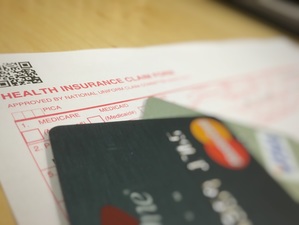Moore Law Group, PLLC
0 Comments
 In accident and personal injury cases, your own insurance company may treat you unfairly and not pay for medical bills they are supposed to. You may even get threats of wage garnishment and lawsuits by creditors and collection agencies. These debts can be expensive, come during a time of crisis, and, worse of all, they exist only because of another person’s wrongdoing. But, having medical debt after an accident or personal injury is manageable. You Have Options to Deal With Medical Bills One common misconception—that only two options exist to deal with debts: pay the full amount or file bankruptcy—is to blame for making medical debts seem so daunting. The first option, paying the full amount of the debt, may use up your ability to pay for basic needs like food, shelter and future medical treatment. And, those funds may be exempt from collections under state or federal law anyway. The second option, filing bankruptcy, likely significantly lowers your credit score, prevents you from getting a home mortgage loan for the next seven years, and leaves your creditors without repayment. Bankruptcy should be a last-ditch option. Lessen Amount Due for Medical Bills in a Financial Crisis Thankfully, there is a third option. You can negotiate a lower payment with your creditors. We call it “debt settlement.” Debt settlement is a win-win scenario. In debt settlement, you pay your creditors based on your legal rights and what you can afford, as a lump sum or monthly payment plan. Paying only what you can afford is especially important if you need future medical treatment after an accident or personal injury. Debt settlement also likely protects your credit score better than bankruptcy, while also repaying a significant amount to your creditors. If you have debts—whether for medical bills, credit cards, auto loans, home mortgages or back taxes--explore your legal options with an attorney experienced with debt settlement and defending people against lawsuits by creditors and collection agencies. Having debt is a fact of life, and you do not have to go at it alone.  One of the best parts of practicing law is helping real people recover from a crisis. Unfortunately, one barrier to a positive resolution regularly arises: a lack of adequate insurance. For the most part, this is a preventable problem. While inadequate insurance can be an issue in any type of claim, it is most prevalent in auto accident or personal injury cases. It is for this reason that I tell anyone who will listen to make sure they have underinsured / uninsured motorist coverage (abbreviated UIM/UM). What is UIM/UM coverage? A typical UIM/UM policy will cover all damages that an insured person is "legally entitled to recover from an underinsured at-fault driver." This means that if you are injured by an underinsured or uninsured driver, you are protected. With UIM/UM coverage, your insurance company is required to provide benefits to you for the damages that the person who hurt you cannot afford to pay. These benefits may include medical expenses, lost wages, nursing care, substitute services, and non-economic damages. The legislature's stated purpose for UIM/UM coverage is "to protect innocent victims of motorists of underinsured motor vehicles." However, UIM/UM is an optional coverage in Washington. Insurance companies issuing policies in Washington are required to offer this coverage to their new policyholders under RCW 48.22.030. While UIM/UM coverage is surprisingly inexpensive, I have found many people decline the coverage--perhaps because they do not realize its importance until a need arises. Why is it important to have UIM/UM Coverage? Usually, the need for UIM/UM coverage is most urgent when someone is severely hurt by an irresponsible driver, e.g. drunk driver or someone driving with a suspended license. Some of the most tragic situations I have encountered involved uninsured drivers causing catastrophic injuries to innocent persons--without any UIM/UM coverage. While you cannot control another person's reckless driving, you can lessen the financial hardship you may experience as a result. Check your policy and make sure you have UIM/UM coverage before you need it.  Some general tips for what to do after a car accident (disclaimer: every situation is different, and these tips are not meant to provide you with legal advice. Consult with a lawyer about your situation, see #6):
I learned the importance of many of these tips from my own experience. Two years into law school, I was in my first (and only) car accident. I left my home around 6am. Only a few minutes from my house, I had just turned left onto a highway when a car in front of me slammed on his brakes and proceeded to make an illegal u-turn across four lanes of traffic. I hit my brakes too, but I slid into the back left side of his truck before he made it across my lane of travel. Thankfully I was not seriously hurt. But, the whole front left side of my car was damaged. I knew just from looking at the damage that my car was likely totaled. I remember sitting in my car, in disbelief about what had happened, until the other driver ran up to my car door and asked me if I was "ok." He apologized over and over again--telling me that he wanted to avoid the traffic ahead so he had tried to make the illegal u-turn. He admitted to me that he had slammed on his brakes and that he knew there was no way I could have avoided the accident. Then he said something that I believed at the time, that I now know I shouldn't have: "Don't worry about the damage, I have great insurance--they'll take care of everything." As you might be able to guess, the great insurance company did not take care of everything--or anything for that matter. It denied coverage for the accident. The adjuster told me (incorrectly) that the following driver is always at fault, even if the other driver made a sudden and unexpected stop--or tried to make an illegal u-turn. My own insurance company said they disagreed, but that it wasn't worth their time to dispute it. I ended up paying for everything out-of-pocket. Don't make the same mistakes I did. We deal with car accidents and insurance companies on a daily basis. Let us steer you clear of the potential pitfalls and help you get back on your feet.  "There is a vague popular belief that lawyers are necessarily dishonest...Let no young man choosing the law for a calling for a moment yield to the popular belief -- resolve to be honest at all events; and if in your own judgment you cannot be an honest lawyer, resolve to be honest without being a lawyer." A. Lincoln, circa 1850 We strive to practice law with integrity. Integrity means a person practices with honest conviction. It means a person acts in conformity with their true beliefs (e.g. about the facts or the law), their identity, and with genuine purpose. Why is integrity so important in the practice of law? This trait is not just a nice word that has little real world meaning. Integrity changes how we interact with our clients, our colleagues, the courts, and our adversaries. Unfortunately, lawyers seem to often overlook the importance and power of practicing with integrity. Perhaps acting in conformity with popular notions about attorneys, some of my colleagues appear to believe that taking whatever position is most convenient at the time is the best strategy. Time and time again, I've witnessed this approach fail. For example, when an adversary fails to accurately set out legal authority or the facts of a case in a motion or brief to a judge, I always gain an advantage. By honestly portraying the legal authority, a judge is much more likely to accept my argument about why my client should prevail. Quickly, judges learn which attorneys in the community are thorough and honest. There is no doubt that practicing with integrity reaps dividends for every client. It also makes the practice of law more rewarding for us. We want to win your case because we believe in you, not just because we want to prevail. We work harder and fight more zealously for our clients because we believe in their cause. Success is measured not simply by dollars and cents, but by whether we made a real difference for you and told your story honestly, as you experienced it. |
Archives
September 2020
This blog does not offer legal advice. If you need legal advice, we recommend you consult with a lawyer and don't rely on a blog.
|
Home
|
Located in Downtown Everett:
2707 Colby Avenue, Suite 1420 Everett, WA 98201 |
Copyright © 2021 by Moore Law Group, PLLC. All rights reserved. We assist clients in cases involving Serious Personal Injury, Wrongful Death, and Insurance Disputes/Denials of Coverage. We handle cases across Washington state, in both state and federal courts, including (but not limited to) Snohomish County, King County, Skagit County, Pierce County, Thurston County, Island County, Spokane County, and Whitman County.

 RSS Feed
RSS Feed



